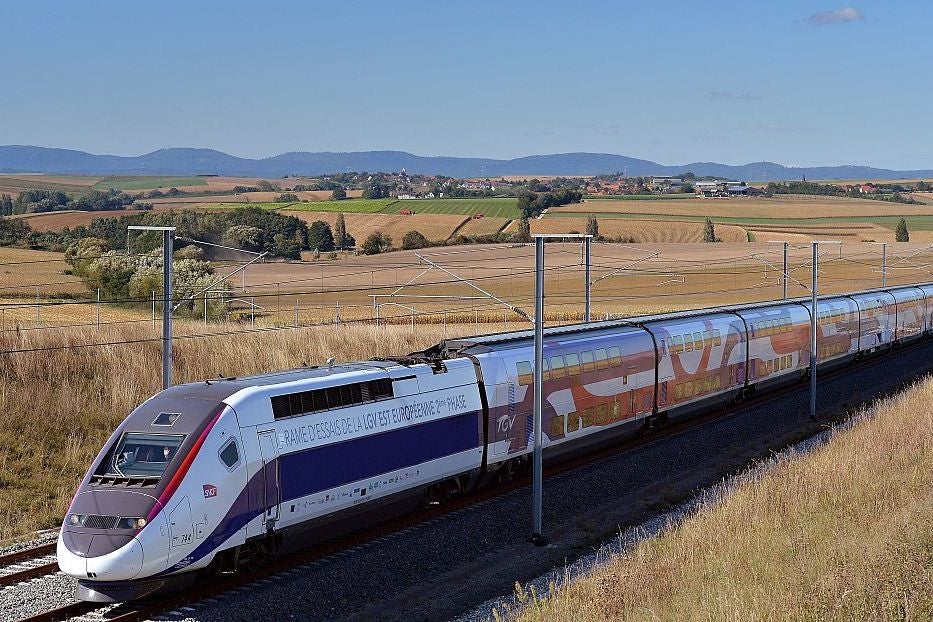Why the new French fast train to Bordeaux shows speed is overrated
Is this thirst for speed ruining the experience of travel? Simon Calder considers life in the slow lane

Your support helps us to tell the story
From reproductive rights to climate change to Big Tech, The Independent is on the ground when the story is developing. Whether it's investigating the financials of Elon Musk's pro-Trump PAC or producing our latest documentary, 'The A Word', which shines a light on the American women fighting for reproductive rights, we know how important it is to parse out the facts from the messaging.
At such a critical moment in US history, we need reporters on the ground. Your donation allows us to keep sending journalists to speak to both sides of the story.
The Independent is trusted by Americans across the entire political spectrum. And unlike many other quality news outlets, we choose not to lock Americans out of our reporting and analysis with paywalls. We believe quality journalism should be available to everyone, paid for by those who can afford it.
Your support makes all the difference.For those of us who love trains, and south-west France, the July edition of the European Rail Timetable begins with heartening news.
“One of this year’s most significant European rail events takes place this month,” reports this commendable compendium of terrestrial mobility. “The opening of two new high-speed lines in western France.”
From Sunday, the beautiful Breton city of Rennes will be 90 minutes from Paris. Bordeaux moves much closer to the capital, with trains taking barely two hours to cover 360 miles.
But even writing from an island which has proved unfeasibly sluggish in creating high-speed rail links, dare I suggest that this pair of new fast lines do not comprise the best thing since sliced tarte aux pommes?
Taking the train all the way from the UK to Rennes, the capital of Brittany, henceforth takes as little as five hours via Paris. But why try? London to Rennes is 244 miles as the corbeau flies. On the Eurostar train from London St Pancras, you spend the first 80 minutes of the journey travelling further away from Rennes. By the time you get to Lille, where the train turns sharp right, you are 278 miles from your target. Personally I would find it a touch dispiriting.
How much happier to be aiming for the heart of Brittany with the help of the overnight Portsmouth-St Malo ferry, from where Rennes is only 50 minutes by train. In a hurry? Fly to Rennes from one of half-a-dozen British airports. Even from Manchester, you would be on bus 57 from the airport into central Rennes before a Londoner on a train had even reached Paris.
The new line to Bordeaux almost halves the time between the Seine and the Gironde, and retrieves the route’s early 1970s title as the fastest inter-city rail link in France. But it shares a problem with the Rennes train: the Paris terminus.
The Eurostar train from London arrives at a handsome and manageable terminus, Paris Gare du Nord. But the high-speed lines to the sud and sud-ouest depart from the fearful muddle known as Montparnasse. When you alight from Metro Line 4 at the laughably named stop of Montparnasse Bienvenüe, don’t expect a warm welcome. Your problems are only just beginning. To reach anything that looks like a proper overground train, you must pick your way through a subterranean labyrinth designed, I speculate, by Franz Kafka’s French cousin. In the unlikely event that you catch your TGV to Bordeaux, you might wonder whether next time you should fly to the city from one of 10 UK airports instead.
Happily, the same European Rail Timetable has some uplifting news about the “classic” French network to south-west France and the Spanish border: “The overnight service between Paris and Portbou/Cerbère, which was withdrawn last December, will be reinstated.”
Some time after the last rites on the last night trains across Europe were administered, an overnight sleeper service is re-emerging from the sidings. From next Friday night, the train to Spain sets off from the handsome, civilised terminus of Paris Gare d’Austerlitz at 10.12pm. Through the night, it trundles through Orleans and Carcassonne before reaching Perpignan – Salvador Dali’s celebrated “centre of the universe”.
As the sun yawns out of the Mediterranean mist, the couchettes trundle through a string of charming resorts along the Côte Vermeille, a corrugated crimson coast.
The last resort in France is Cerbère, from where the gare-to-plage journey takes four minutes; the beach wraps itself happily around the last bay in France. Or stay on the train to Portbou on the Spanish border, a rather grand station for a small fishing village. For the 20th-century traveller, Portbou was one of Europe’s great transits.
While high-speed trains whizz through on their busy way between Paris and Barcelona, this is a place for the traveller with time to spare. The resurrection of the night train shows that vitesse is not always of the essence. While the new high-speed lines created by SNCF will bind France ever closer, there is still room for a touch of class and romance on the rails.
Join our commenting forum
Join thought-provoking conversations, follow other Independent readers and see their replies
Comments